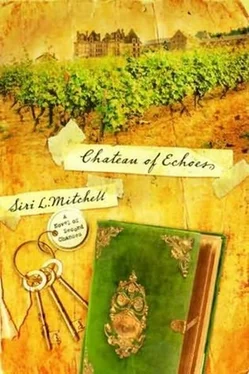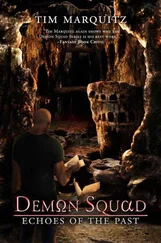Siri Mitchell - Chateau of Echoes
Здесь есть возможность читать онлайн «Siri Mitchell - Chateau of Echoes» весь текст электронной книги совершенно бесплатно (целиком полную версию без сокращений). В некоторых случаях можно слушать аудио, скачать через торрент в формате fb2 и присутствует краткое содержание. Жанр: Современная проза, на английском языке. Описание произведения, (предисловие) а так же отзывы посетителей доступны на портале библиотеки ЛибКат.
- Название:Chateau of Echoes
- Автор:
- Жанр:
- Год:неизвестен
- ISBN:нет данных
- Рейтинг книги:3 / 5. Голосов: 1
-
Избранное:Добавить в избранное
- Отзывы:
-
Ваша оценка:
- 60
- 1
- 2
- 3
- 4
- 5
Chateau of Echoes: краткое содержание, описание и аннотация
Предлагаем к чтению аннотацию, описание, краткое содержание или предисловие (зависит от того, что написал сам автор книги «Chateau of Echoes»). Если вы не нашли необходимую информацию о книге — напишите в комментариях, мы постараемся отыскать её.
Chateau of Echoes — читать онлайн бесплатно полную книгу (весь текст) целиком
Ниже представлен текст книги, разбитый по страницам. Система сохранения места последней прочитанной страницы, позволяет с удобством читать онлайн бесплатно книгу «Chateau of Echoes», без необходимости каждый раз заново искать на чём Вы остановились. Поставьте закладку, и сможете в любой момент перейти на страницу, на которой закончили чтение.
Интервал:
Закладка:
“But I looked on you as a friend.”
“You looked on me as your door against the world. I used you. You used me.”
Cranwell stepped beside me, as if to offer support.
“ Et vous, Robert ? All I ever hear from you is Freddie. Freddie think this and Freddie do that. I am sick in the stomach of Freddie. I will only ask this one time more: Give it to me.”
“It’s not yours to have.” I placed it behind my back.
“I must have this.”
Cranwell stepped in front of me again. If we kept this up, sooner or later, we’d both be standing in the hole. “It’s not yours to keep.”
“I must have it. You know what this is? It is a scroll. It is written by Joseph of Aramithea and it may reveal the location of the grail. And if I can find the grail, then I will be named. And if I am named, then I will exist.”
I grabbed Cranwell’s hand and tugged him closer to my side. “But you can’t make your father love you.”
“Love! I do not want his love. I want his pride. I want his honor. I want him to look at me. I just want him to see me. Give me the scroll.”
“I can’t.”
She lunged toward the floor, picked up one of the knives. “Give it to me.”
Cranwell shoved me behind him. I ran for the door.
Sévérine was brandishing the knife at Cranwell.
“You don’t want to do this.”
She sprung at him.
Cranwell dodged.
Sévérine lost her balance, fell to the floor. She hurled the knife at him.
It missed. Fell into the hole in the floor.
She looked at it for a long moment and then began to scream. Clapped her hands to her ears.
Cranwell knelt beside her.
“Leave me!”
He put a hand to her arm.
She twisted, picked up another knife, plunged it into her thigh. “Leave me alone!”
As Cranwell pried it from her grip, I ran to the lounge and grabbed the phone. Called emergency services.
By the time I got back to the bedroom, Cranwell had gathered all the sharp objects and deposited them on my bed. He’d also tied one of my scarves around Sévérine’s leg.
She was still on the floor, but she’d drawn her legs up to her chest and was rocking back and forth, staring off into space.
I knelt beside her, placed a hand on her back. “Sévérine? Do you want me to call your father?”
Her eyes never moved; she didn’t quit rocking, but she nodded her head.
“Who is he? Where does he live?”
I had to ask several times, but finally she told us. I dialed the operator, had her place the call. When her father came to the phone, I introduced myself, told him Sévérine needed him. Desperately.
“Sévérine? Sévérine who?”
“Your daughter.”
“I have no daughter.” He hung up before I could respond.
I could only stare at the phone, wondering what sort of parent would pretend a child didn’t exist.
When I walked back into the bedroom, Sévérine paused in her rocking. “He will not come, Frédérique?”
I shook my head.
“He will never come.”
By the time the ambulance came, she was curled on the floor in a fetal position, humming scraps of a tune I recognized as a French nursery-school song. They took her to the regional hospital for evaluation.
Cranwell brought the leather rod down into the kitchen after Sévérine was taken away. He placed it in the middle of the island. We each took a stool, sat down, and stared at it. It was innocuous. Only a foot long, and two inches in diameter, it didn’t look like anything important. The leather had worn to a smooth patina, but the amethysts still glittered. And etched into the leather on one side was a curious-looking ‘N’ with a wavy line set on top of it.
After a while, I got up, opened a drawer, and took from it a butter knife. Then I reached for the case and gently probed for an opening. Finding a slit near the top, I pried it open.
Inside was a scroll. It was not very big. Perhaps the size of three normal sheets of paper set side-by-side.
Cranwell left his stool and came to stand beside me.
The lines of script were very small and very tight. As little as I knew about Near Eastern script, the letters looked to be formed by a disciplined hand. I looked at it from every angle and felt cheated when it revealed nothing to me.
Cranwell reached out to finger a corner. It looked like vellum. He rolled it up and then fit it back into the case.
The next day, I drove it to Rennes and entrusted it into the care of the University of Rennes II.
The next week I received an enthusiastic letter from M. Dubois. In collaboration with the University of Nantes, the scroll was to be analyzed and translated. He promised to keep me informed of the progress and invited me to visit at the first opportunity. At the very least, he wanted me to know the scroll was 1,900 years old and that its author was a Joseph or Yosef of Arimathea.
It turned out that Alix was probably a Jew. At least on her mother’s side. In the 1300s, one of the French kings ordered all Jews expelled from the realm. Many who lived near Brittany went to Spain or Italy; others went to what was then called the Kingdom of Provence. Some kept their faith, others converted and tried their best to disappear or blend in with the culture around them. After several generations, some even journeyed back to the northern parts of France.
It’s possible that Alix’s father never knew his first wife’s origins, but I suspect he did. Why would he otherwise have given the scroll to his daughter? Jewish identity is passed from mother to child. Alix’s father might not have been a Jew, but she would have inherited that identity from her mother.
If the scroll were determined to have been written in ancient Hebrew, how did Alix’s mother come to have it? It’s likely that the ancestors of Alix’s mother originally came from the northwestern region of France, the part that bordered the old Kingdom of Bretagne. It’s also possible that the legend is true: that Joseph of Arimathea did flee from Israel to Gaul after the death of Christ.
Julius Caesar conquered the region in the first century BC and Gaul was integrated into the Roman Empire. If Joseph did flee to Gaul, he may have brought the grail with him. If he brought the grail with him, he may have written about it. He was a member of the Sanhedrin, the Jewish Supreme Court. In order to have been a member of the Sanhedrin, he also had to have been a master student of the Torah and highly educated. There’s no disputing that he knew how to write.
Family heirlooms have been passed from generation to generation for hundreds of years. Why could the scroll not have been passed down through generations? Why could family legend not have imbued the scroll with enough importance that it was regarded as a treasure to be kept safe and protected?
Sévérine must have recognized the Hebrew letters Y and A from Alix’s description of the baton, the container of the scroll. In Hebrew, each letter is also assigned a numerical value. The initials of Joseph of Arimathea, or Yosef of Arimathea, would have been Yod, Aleph. The letters Yod and Aleph taken together add up to eleven.
Eleven symbolizes incompletion.
From her study of the journals, Sévérine knew that the twelve stones that decorated the lid were amethysts; Alix had said so herself. And from her studies of ancient texts, Sévérine knew that the amethyst represented the number twelve.
Twelve symbolizes completion.
If the scroll belonged to Yosef of Arimathea, as the initials indicate, why did he use twelve amethysts when his initials totaled eleven? Perhaps because the instructions inside would lead to completion. To the grail. To a symbolic communion with Jesus, where he again would join his disciples.
At least, that had probably been Sévérine’s reasoning.
Читать дальшеИнтервал:
Закладка:
Похожие книги на «Chateau of Echoes»
Представляем Вашему вниманию похожие книги на «Chateau of Echoes» списком для выбора. Мы отобрали схожую по названию и смыслу литературу в надежде предоставить читателям больше вариантов отыскать новые, интересные, ещё непрочитанные произведения.
Обсуждение, отзывы о книге «Chateau of Echoes» и просто собственные мнения читателей. Оставьте ваши комментарии, напишите, что Вы думаете о произведении, его смысле или главных героях. Укажите что конкретно понравилось, а что нет, и почему Вы так считаете.












